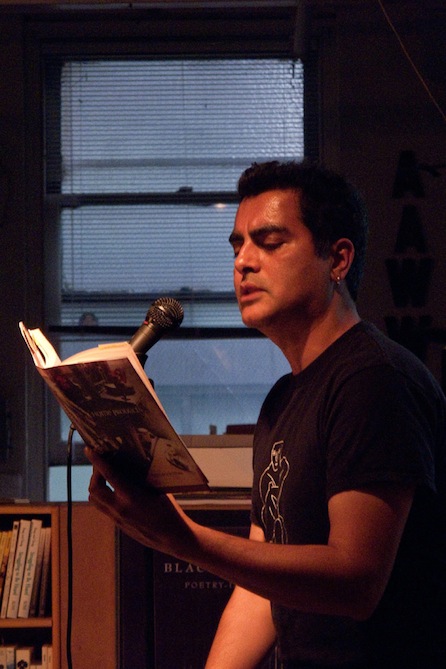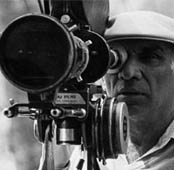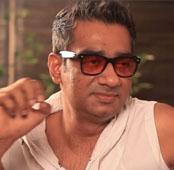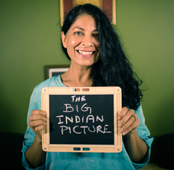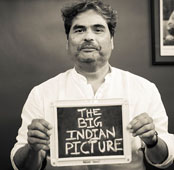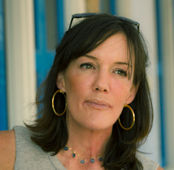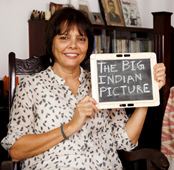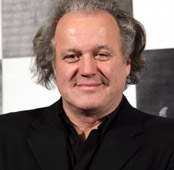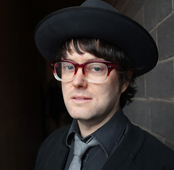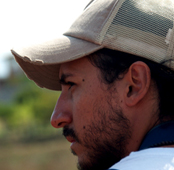-
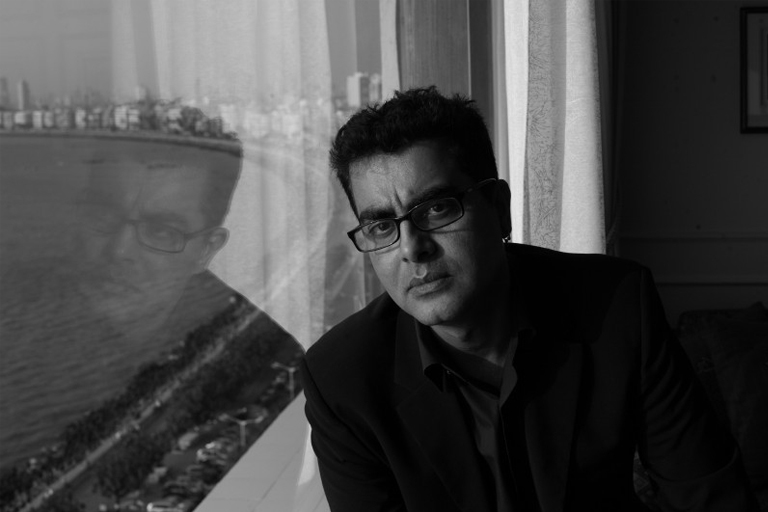 Amitava Kumar | Photo Credit: Neeraj Priyadarshi
Amitava Kumar | Photo Credit: Neeraj Priyadarshi
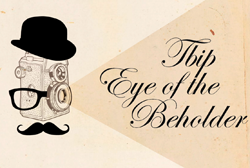
As part of this series we bring to you conversations on cinema with artists, photographers, writers, performers and journalists. The movies that have made an impact on their lives and their work. We trace the life of a movie outside of itself– on a canvas, in a novel or a sculpture. We look at a familiar film through unfamiliar eyes; eyes that reinterpret the images on the screen and give them a new form. We go into places where the lines between mediums dissolve. Where inspiration is not distinguishable from creation. Where movies are not distinct from memories.
First in the series, a quick Q and A with writer Amitava Kumar.
Your first film-related obsession?
I was six or seven. I’d cut out pictures of actors from the Illustrated Weekly (The Illustrated Weekly Of India)—a memorable one had Pran, with rosy cheeks, peeling an apple—and stick them in a scrap-book. Jeetendra at the bottom of the stairs, Rajesh Khanna driving a red car, stuff like that. I learned I was doing something wrong when one of my parents threw the scrap-book away.
One thing you miss about the way in which you saw movies as a child?
We’d be visiting relatives in one of Bihar’s small towns and we would pile into rickshaws and go to a cinema-hall to watch a film. Each town had its own special offering of food during the interval. My favorite was seekh kebab in Bettiah.
The worst book to film adaptation?
I know that the film Guide has many admirers. I love many of its songs myself, but I’m sorry, in almost every sequence we are witness to Bollywood pissing on everything quiet or contemplative about (R.K.) Narayan’s writing.
If you were to adapt a film to a book, it would be…
Vishal Bhardwaj’s Maqbool might well have been based on Shakespeare’s Macbeth, but it is inventive enough, rich enough, to be turned into an absorbing work of literature.
A sequence/ character/ plot in any of your books that has been inspired by cinema?
My novel Home Products was very much inspired by the Manoj Bajpai character in Ram Gopal Varma’s Satya.
Do you read film reviews? What do you look for in a film review?
You need a good critic to tell you about the ways in which a work of literature or a film is in conversation with other works. I read good reviews, say by Namrata Joshi in Outlook, because she is good at sketching a quick family tree. There are other reasons for reading reviews, when critics are successful in presenting an attitude, or outlining what is elusive or unexpressed in a powerful film.
In a movie version of your life who would play you?
Manoj Bajpai.
What book of yours could be made into a film?
I once wrote a story for Mahesh Bhatt and when it wasn’t used I put it in the novel I was writing at that point. I had tried to set a (Anton) Chekhov story in India. But once I started thinking in terms of Bhatt, I began to invent a storyline for a new film and put that in the novel too. The imagined film was called ‘Prithvi’. All of this is in Home Products.
Who would you like it to be directed by?
The director I really like is Dibakar Banerjee. Also, of course, Vishal Bhardwaj and Anurag Kashyap. But I have to tell you, I grew up wanting to write a story for the likes of Shyam Benegal and Govind Nihalani. Films like Nishant or Aakrosh are seared into my memory.
Who would you cast ?
In Home Products, while writing about a man named Rabinder dreaming of making a film when he came out of prison, I imagined Manoj Bajpai playing that role. I spent some time with Manoj and it allowed me to flesh out the character. And Tabu! Tabu as the demure but strong woman whom he discards.
One male actor you’ve always loved?
Naseeruddin Shah and Om Puri. I can’t choose one over the other. I’d lay down my life for any of them. I hope that last statement has a nice filmi ring to it.
One actress you absolutely adore?
Oh, this is difficult. It is a glittering galaxy. Those trips I took to Bihar’s small towns were lit up with encounters with Madhubala and Waheeda. In those days, those theatres screened old classics all the time. Later, when I was a student in Delhi, Shabana (Azmi) and Smita (Patil) fired my imagination. Tabu ever since.
What fictional characters would you like to see your favourite actor/actress play?
I remember a Satyajit Ray adaptation of a Premchand story Sadgati in which Om Puri had starred. It would be wonderful if some of our most powerful stories received a similar treatment.
One writer whose biopic would definitely be A-Rated?
Saadat Hasan Manto. It would be wonderful not only because it would involve the upheaval of the Partition but also the story of Hindi films.
A writer whose biopic you want to see?
Other than Manto? You know, I was always fascinated by a writer like Nirmal Verma, going out of India at a time when it was rarer, living in Europe, and then coming back with new sensibilities. A refined filmmaker would shine a light on the mysteries and make the mystery deepen.
One non-fiction title that could make for a good film?
Good question. Anurag Kashyap made tremendous use of my friend S. Hussain Zaidi’s Black Friday. Aman Sethi’s book A Free Man could have tremendous dialogue. Biharis spouting abuse in Delhi is an underrated cinematic resource!
One thing that the novel can do which a film can’t?
I think films are to be watched with others, while a novel is to be consumed alone. I take that as a given. A novel guarantees you solitude. A film ushers you into a broader collective experience. Which is to say, I go to novels for inwardness.
One thing that cinema can do that a novel can’t?
Technically speaking I find that films can do collage so much more successfully. Transitions are easier too. So many jumps, so many cuts, are accomplished so much more seamlessly. You don’t need too much back-story because the eye can take in so much at once.
A film that made you very happy?
There was a time—I’m talking here of thirty years ago—when films like Chashme Buddoor and Jaane Bhi Do Yaaro lit up my life with laughter. I watched 3 Idiots in a theatre in Washington DC. It was a very fun experience.
A film that made you cry?
This is embarrassing. Even bad films make me cry. Chak De wasn’t a bad film at all, but yes, I remember bawling when I watched it.
A film you keep re-watching?
I have watched Shakespeare Wallah many times. Many early Shyam Benegal movies too. When working on Home Products, I watched Satya several times. Maqbool I have seen often too.
A film you would recommend for its dialogues?
I have just watched Gangs of Wasseypur. The dialogue there flows like hot lava.
A film every writer must see?
Writers are drawn to films that show characters finding their artistic selves. I recommend Shyam Benegal’s Bhumika. Smita Patil is unforgettable. It is a gem of a film.
Your favourite film on writing/ a writer?
Il Postino (The Postman), which featured Pablo Neruda, on the side of the frame as it were, was a film with great charm.
If you ever made a film it would be…
A film in which the visual image would be streaked with the light of verbal poetry.
A film script you would like to read?
Monsoon Wedding.
A film you wish you had written?
Maybe I should say something like Deewaar but I’ll say Monsoon Wedding.
One underrated film?
Why isn’t the film Party better known? Prakash Jha’s Damul won a national award but does it occupy a place in the national consciousness?
One highly rated film that did not work for you?
Sanjay Leela Bhansali’s Black was voted among the ten best films of the year by TIME Magazine. It won many Filmfare awards. Really? I don’t need to inform you that filmmakers can take a complicated story and turn it into sentimental garbage flecked with psychological pap.
Name one male and one female character from the movies whom you could imagine having an interesting conversation with?
Salim Mirza, the character played by Balraj Sahni, in M.S. Sathyu’s Garam Hava. And the girl played by Sreela Majumdar in Mrinal Sen’s Khandhar. I suspect there wouldn’t be much said during dinner but I’d want very much to share a meal with them and, for a while, stand inside their circle of sadness.
Amitava Kumar is a writer and journalist born in Ara, Bihar; he grew up in the nearby town of Patna. Currently, he is Professor of English on the Helen D. Lockwood Chair at Vassar College.
Kumar is the author of Husband of a Fanatic, Bombay-London-New York, Passport Photos, Evidence of Suspicion, a book of poems titled No Tears for the N.R.I. and a novel called Home Products.
Eye of the Beholder: Amitava Kumar
InterviewSeptember 2012
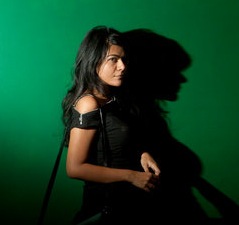 By Pragya Tiwari
By Pragya Tiwari
Pragya Tiwari is Editor-in-Chief, The Big Indian Picture



